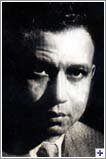
Since February is Black History month, I thought I'd share an article that I wrote for our newsletter on Frank Yerby.
I first heard of Frank Yerby while watching the movie version of his novel The Foxes of Harrow on late night television. Rex Harrison played Stephen Fox, a gambler, newly arrived in New Orleans. He builds "Harrow", the greatest mansion house and plantation in Louisiana. In the book, he loves three women: Odalie Orceneaux, his wife; her sister, Aurore; and Desiree, his Black mistress. Fox had a child by each of them. Of course,
 none of that made into the movie, it was the 1940’s after all. But it was certainly juicy stuff for an eleven year old.
none of that made into the movie, it was the 1940’s after all. But it was certainly juicy stuff for an eleven year old.When I discovered it was based on a work of fiction, I immediately sent out to find a copy in the library. This was in the seventies when writers like Frank Yerby, Catherine Cookson, John Jakes and Taylor Caldwell were still writing novels of historical fiction. I had no idea that Frank Yerby was African-American until I saw his photo on the book jacket. My limited experience with black authors back then was reading the poetry of Phyllis Wheatley and reading Toni Morrison.
Reading Frank Yerby’s novels opened up a whole new world for me. It also made me realize that I could write historical fiction, and not be limited in my subject matter.
Frank Yerby was the first African American to write a best-selling novel and to have a book purchased by a Hollywood studio for a film adaptation. During his prolific career, he wrote thirty-three novels and sold more than fifty-five million hardback and paperback books worldwide. Two other books were also adapted for Hollywood, The Golden Hawk and The Saracen Blade.
His first literary success came in 1944, when he received the O. Henry Memorial Award for his short story "Health Card," which focuses on the racial inequities faced by an African American soldier and his wife. Prior to this story, Yerby had written a protest novel about racial inequities in the South, but publishers had rejected it. Perhaps as a result, he began to write historical novels centering most often on white protagonists.
It is from these novels that his literary reputation was built. The Foxes of Harrow (1946), in particular, laid the foundation for his career as a popular novelist by becoming the first best-selling novel by an African American author and earning him the title "king of the costume novel."
Many of his novels were set in the antebellum South and feature dashing white male protagonists who experience adventures of romance, mystery, and intrigue. Also, unusual for the time, they feature interracial romances when it was still illegal in many states for blacks and whites to sit at the same lunch counter, let alone get married. He also wrote novels set during the French and American revolutions, Central America, the South, ancient Greece and Israel that were meticulously researched.
He also wasn’t exclusively a novelist; he was also a short story writer and a poet as well. His stories have been included in A Century of the Best American Short Stories, and his poems in American Negro Poetry.
He was often criticized by other African-Americans for not writing solely about black protagonists. Even though, he held the distinction of being the first best-selling black novelist, he was also disparaged for his lack of racial consciousness. His response was that a novelist shouldn’t inflict on the public his private ideas on politics, race, or religion.
In 1991, he died of congestive heart failure in Madrid, Spain, his place of residence since 1955, after he left the States to protest racial discrimination. His books are now out of print, just a footnote in literary history while other writers such as Zora Neale Hurston, and James Baldwin are still studied and talked about. Hopefully one day, he’ll receive the recognition that he deserves as a truly talented writer of historical fiction.
No comments:
Post a Comment